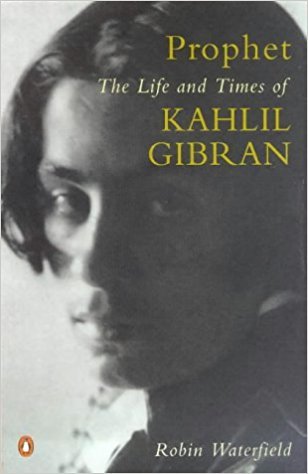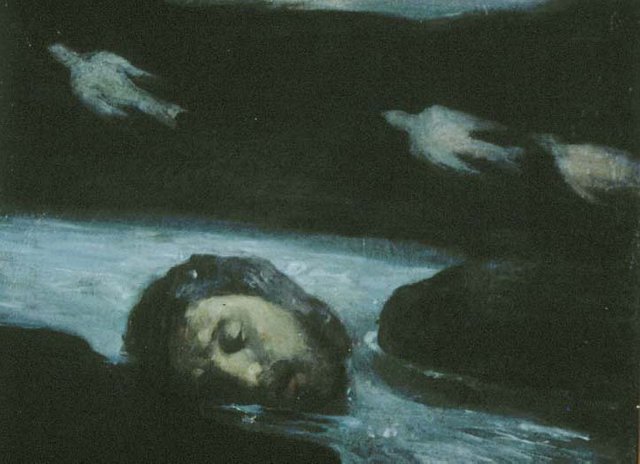The Dark Side of a Creative Artist

Robin Waterfield's persuasively argued, human-all-too-human, biography of Gibran is like none of the other hagiographies I’ve read of the revered author of The Prophet . In fact, it is curiously reminiscent of another biography of a very different man --Jame's Miller’s Passion of Michel Foucault. Both books, with authoritative confidence, paint a portrait of their subjects quite unlike what people expect, carefully exploding the myths surrounding, and created by, the philosophers in question. In reading these works, I'm reminded of these wise words by yet another philosopher, Pascal:
Man is neither angel nor beast. And, it is his misfortune that he who seeks to play the role of angel acts most like a beast.
Of particular interest to me is Waterfield's presentation of the formative influences on young Gibran. Certainly, Gibran was a Romantic (to a fault, perhaps) and yet, while the author asserts that the Lebanese artist/poet was a ‘tabula rasa’, the biographer still allows for a certain temperamental leaning towards this peculiar response to life and art. Of equal interest is the excruciating tension Waterfield portrays between the man and the myth as well as the thought-provoking notion of life as literature.
“I am a false alarm” he has Gibran cry out in the book's Overture.
In this I hear an echo from another writer I admire and who, like Gibran, I consider to be a formative influence, Kafka. “You overrate me. Your trust oppresses me … I am no burning bush … I am no light. I have merely lost my way among my own thorns. I am a dead end.” Gustav Janouch has Kafka say this in distress -after presenting him with a bound copy of 3 of his stories.
Likewise, the number of times Nietzsche despairs, and/or doubts himself, are only matched by his (just as often) violent attempts to assert, or over-compensate, himself. I make these parallels because I wish to emphasize the gulf between the person and the persona, which Waterfield references, as well as the gulf between the human and the enormity of his self-imposed task. Yet, in the uncharacteristically cautious words of Freud, I also realize that: before the creative artist, psychology must lay down its arms.
That said, Waterfield makes some sobering observations in his biography, such as when he writes of Gibran's: “monomaniacal and exploitative selfishness that he shares with creative people”, or his inability to empathize, his narcissism, manipulativeness, etc… all in the interest of his self-preservation. Ultimately, what emerges is, at once, a more real and complex character than has been previously permitted.
Most distressing for me are Gibran’s alternately pathetic, ridiculous and (perhaps) pathological ‘untruths’: “Should one tell a lie which does not hurt you nor anyone else, why not say in your heart that the house of his facts is too small for his fancies, and he had to leave it for larger space?” This Gibran confesses in his wonderful book of aphorisms, Sand and Foam.
To readers unfamiliar with Gibran's oeuvre, I recommend they counter the troubling effect of this biography with Gibran's elevating aphorisms in order to remember the intoxicating Higher Self and larger space that Gibran longed to inhabit. Longing, according to philosopher Heidegger, is the agony of the nearness of the distant. And, whatever his faults, Gibran certainly longed to cover that distance, between the real and Ideal, throughout his life and art. In fact, longing might be one of the most frequently used words/recurring themes throughout his body of work.
In the end, despite Waterfield's problematic relationship with the man Gibran, he concludes on this high note that we might all benefit from:
Would that we all turn our complexes … into sources of creative energy and strength!


Image: Kahlil Gibran, The Head of Orpheus
wise people protest against the pedestals others put them on- it's a long way to fall and deep thinkers know they aren't exactly emotionally 'bouncy' ;)
Two astute points, my friend; you really know your stuff when it comes to the clay feet of our idols :)
I think a certain forgiveness can be extended to the dead. I read his Wikipedia article. I had no idea he is the third most popular poet ever. It says he was an alcoholic late in life, so he probably had his personal demons. We can always consider his goal or his longing, human frailty is not as interesting anyway. :-)
I agree. As he said: We are as great as our Longing (and his was tremendous). If you’ve not already, I recommend you read his book: The Prophet. 🙏🏼
Thanks for the recommendation, I am definitely more aware of his work now. Peace
Happy discoveries--he's, certainly, a poet/artist/thinker worth knowing
_/|\_Perhaps I am reading something into this that is not intended but it sounds as though he were a fanciful socio-path.
Personal experience has told me that these types of individuals have a rapidly shifting psyche and even a fractured one. The shifting awareness can make for greater creativity for sure. But it is a huge price to pay. Quite often they are not aware even of the meaning of the work they translate. I think I prefer a more observational or empathic approach.
Great review here, Yahia:)
Thanks, Pryde, but I think you might be going a tad too far, here :) I think what Gibran had is garden-variety selfishness, common to many great artists (I think of Rilke, by association; but, really, there are far too many to mention). Not sure what you mean by "work they translate" as Gibran was not a translator, but an accomplished artist, poet, philosopher. If you're not familiar with his work, I highly recommend The Prophet or Sand & Foam as an entry point. Cheers, Yahia
I have read some Gibran ... all artist are translating from where all creativity comes from. I have no opinion of my own about Gibran ... I never met him ... but the quote offered seemed severe to me about him and artists in general. So I thought ... what kind of guy was this ... not all artist or even most artists fit the description offered by the biographer, but maybe the ones we like to read about do. Gibran reported problems may have been linked more to his alcoholism and poverty than being an artist. My remark was about how he was described and not who he really was ... I am sure he was more complex than a flawed generalization. I was really looking for some clarification. Whatever the case, there does seem an element of tragedy to his tale.
The Prophet was on my mom's bookshelf as a kid along with other philosophers. My parents are boomers, and very aware of cold war and communism. I think works like The Prophet in the 70s really appealed to the cold war generation. I remember it being nested along side Ayn Rand, Edith Hamilton's Mythology, Parmedes(sp?), Homer, and books on Dead Sea Scrolls. I read it in pieces as a kid on lazy afternoons within the quiet of sunlight shafts on bland tan carpet.
Thanks, for sharing that. Yeah, my folks were fond of him, too... Then, again, my dad is Lebanese, so Gibran is really inescapable. He's also a formative influence on my work as a writer: a mix of Nietzsche, Blake and the Bible. I like the image of you reading him as a kid-- it's not unlike my experience :)
I hear about him and he is very famous. Unfortunately I didnt read any of his stories yet. I read more about history or philosophy.But will definitely have a look at them. He is not an author that can be missed out.
No, he cannot be missed, I agree. I recommend you begin with his book The Prophet-- it's full of philosophy, spirituality and poetry. Also, he's an accomplished artist, and you might find a copy illustrated with his drawings/paintings :) Happy discoveries!
I didnt know he writes about philosophy and spirituality. Thats exactly the type of books I read. Will definitely check it out :)
Yes, he's known as a philosopher and mystic. Hope you enjoy his work.
_/|\_I read a bit of one of his books and I liked his style. It was nice to discover more about his personality.
As an artist, Gibran is one of the giants, a modern day Blake in a way. Here are some of my favorites among his sayings, alongside his paintings, on the occasion of his birthday.
very good, legendary
Check out https://steemit.com/@a-a-a